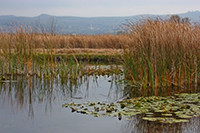Med-ESCWET – Wetl ands as climate regulators

As part of the COP21 in Paris, Plan Bleu presented its Med-ESCWET project, which explains the mitigating role played by Mediterranean wetl ands, whose estimated current area of between 15 and 20 million hectares has been halved since 1900. Where they have not been degraded, wetl ands such as marshes, deltas and lagoons help regulate the climate by reducing greenhouse gases emissions and protecting against extreme climatic events (e.g. flooding, drought, coastal storm damage) by controlling water levels. To further its studies on the ecological services they provide, the Med-ESCWET team has selected four pilot sites (in Egypt, Turkey, Croatia and France). A report, due to be published in September 2016, will shed light on the issues involved in the conservation or destruction of certain ecosystems under threat from developers.
According to Plan Bleu, water is the principal vector through which climate change will impact populations, especially in the Mediterranean where dem and is expected to grow on average by 18% ( and up to 30% in the south and east of the region). Simultaneously, available water resources will be reduced by 20% due to global warming.
Water management remains one of the challenges facing the Mediterranean Strategy for Sustainable Development (MSSD) -currently undergoing revision- which believes that a 25% reduction in consumption is attainable by 2025.



